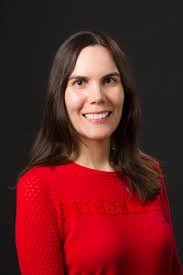Alumni Profile: Ana Luisa Perdigoto, M.D., Ph.D. (’12)
by Michael Raddatz (G2)

Dr. Ana Luisa Perdigoto moved to the United States at six years of age and grew up in a close-knit Portuguese community in Newark, NJ before earning her degree in biochemistry at Brown University. After working for two years at Dana Farber, Dr. Perdigoto came to the Vanderbilt MSTP where she worked with Bruce Carter investigating mechanisms by which myelin limits axonal outgrowth. She left Vanderbilt for Internal Medicine residency at Yale New Haven Hospital in the Physician-Scientist Track, and is now an Endocrinology Fellow and works with Kevin Herold in research on the mechanisms of pancreatic beta cell death in response to inflammation in type 1 diabetes. She is currently focusing on integrating the new phenomenon of checkpoint inhibitor induced diabetes into this paradigm.
What role has your PhD training served so far in your career?
My current research focus is very different from my PhD training (Endocrinology and Immunology vs Neuroscience and Biochemistry respectively). However, the critical thinking and analytical skills that I developed during my PhD training have facilitated my transition into a new research field and helped me adapt more easily to novel techniques. My PhD training has also given me the confidence to actively engage and participate at meetings and conferences. I feel that I received excellent presentation and grant writing training at Vanderbilt and these have been valuable during my fellowship.
What was your favorite thing about Vanderbilt’s MSTP?
My favorite thing about Vanderbilt’s MSTP was by far the collegiate and supportive environment. It was clear from day one that we were cared for and that our wellness and success mattered. Vanderbilt provided me with a sense of family and community and I left Vanderbilt with wonderful mentors and friendships. The Advisory Colleges were inaugurated while I was at Vanderbilt and I think the importance the program places on mentorship is invaluable.
Do you have a favorite lasting memory or lesson learned from your time at Vanderbilt?
My favorite memories at Vanderbilt include the events that fostered long lasting bonds, from welcome parties for new MSTP students, Advisory College get-togethers, lab outings, retreats, etc. I also have ingrained in me Dr. Terrence Dermody’s rules on how to prepare and deliver an effective presentation. Every time I prepare a presentation, I think of Dr. Dermody and follow his advice (black letters on white background, limit text on each slide, use large enough font, etc). It is a simple lesson, but being effective presenters is an important part of our careers as physician-scientists and I follow his advice to this day.
What advice do you have for current MSTP students?
It’s okay to do things at our own pace and forge our own paths. My PhD project hit several roadblocks and challenges, requiring 5 years of graduate school. I remember worrying that I might not be moving along as quickly as some of my colleagues and wondering how this would impact my career. Looking back, it seems silly that I felt this way and I wish I hadn’t compared myself to others. Overall, you will leave Vanderbilt with excellent training and I would say to not doubt yourself and enjoy the journey.
Transitions can be challenging – from M2 to G1, the transition back to Medical School, transitioning to residency and then fellowship. I would take advantage of the Advisory Colleges and speak to others that have gone through these transitions. The transition back to M3 was particularly challenging and intimidating for me. It helps to maintain some clinical exposure during graduate school (I worked at the Shade Tree Clinic). Even though I felt a bit rusty during my first clinical rotation, I caught up relatively quickly, as did my other MSTP colleagues
Do you have any advice regarding choosing your residency field?
When I was struggling with my medical field decision, a mentor at Vanderbilt suggested that I pick my residency/fellowship based on my clinical interest (it was essential that I enjoy the clinical aspect of my work) and that the research interests and projects would naturally follow. I realized during medical school that I was happiest on the Medicine service. I valued the complexity of the patients and knew it was the right fit because I looked forward to going in every morning and didn’t mind staying late to care for my patients.
How have you maintained a work-life balance throughout the training process?
My main support has been my family and friends. Spending time with them always reenergizes me. Taking time for myself, whether it be watching a movie, reading a book, cooking, etc. has been essential. If I feel that I need a break I might take a trip home or into NYC, even just for a day, and it makes a huge difference. When I do this, I try to disengage electronically. Sometimes we feel pressure to be connected all the time and respond to work emails immediately, but I try to avoid this and focus on relaxing with my friends and family during this time.
What do you see as the future of physician-scientists?
I find on a regular basis that physician-scientists contribute uniquely both in the clinical and research setting and continue to provide an important bridge between the two. The critical thinking and inquisitiveness physician-scientists bring to the clinic and the clinical perspective they bring to the lab are invaluable. We remain uniquely situated to contribute to patient centered research. The field of cancer immunotherapy, for example, is a rapidly growing field where the contributions of physician-scientists has been instrumental. I also feel that underrepresented groups among physician-scientists, such as minorities and women, need to be encouraged and supported to both pursue and thrive in physician-scientist careers.